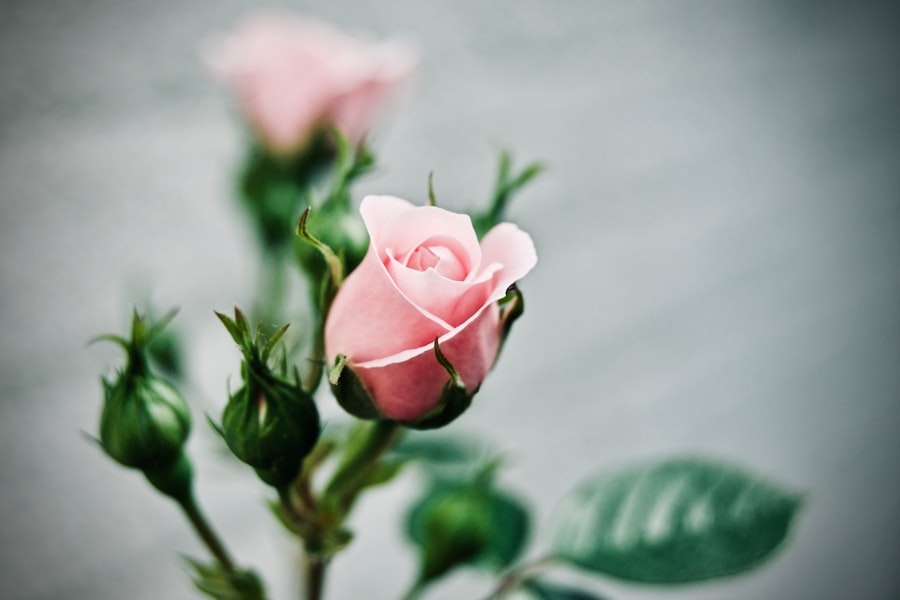Roses are one of the most beloved and iconic flowers in the world. With their delicate petals and intoxicating fragrance, they have captivated humans for centuries. Roses have played a significant role in human history and culture, symbolizing love, beauty, and various other emotions. From their origins in ancient times to their modern-day cultivation and commercial value, roses continue to hold a special place in our hearts and society.
Key Takeaways
- Roses have a long and rich history, dating back to ancient times.
- Roses are symbolic of love, beauty, and various other emotions and concepts.
- There are many different varieties of roses, each with their own unique characteristics.
- Growing roses requires careful attention and care, but can be a rewarding experience.
- Roses are used in perfumery, medicine, and have significant cultural and commercial value.
The Origins of the Rose: Tracing the History of this Timeless Flower
The rose has a long and fascinating history that dates back millions of years. The flower is believed to have originated in Asia, specifically in regions that are now modern-day China and Iran. Through the process of evolution, wild roses gradually developed from simple flowers into the complex and diverse species we know today.
Early humans were drawn to the beauty and fragrance of roses, leading to their cultivation around 5,000 years ago. The ancient Egyptians were among the first civilizations to cultivate roses, using them for decorative purposes as well as for medicinal and cosmetic purposes. From Egypt, the cultivation of roses spread to other parts of the world, including ancient Greece and Rome.
The Symbolic Significance of Roses: Love, Beauty, and Beyond
Roses have long been associated with love and beauty in various cultures around the world. In ancient Greece, for example, roses were closely linked to Aphrodite, the goddess of love and beauty. In Roman mythology, roses were associated with Venus, the goddess of love.
The symbolic meanings of roses vary across different cultures. In Western culture, red roses are often associated with romantic love, while yellow roses symbolize friendship and joy. White roses are often associated with purity and innocence, while pink roses represent gratitude and admiration.
Roses have also played a significant role in literature and art throughout history. From Shakespeare’s famous line “A rose by any other name would smell as sweet” to the iconic painting “The Birth of Venus” by Botticelli, roses have been used as a symbol of love, beauty, and passion in countless works of art.
The Different Varieties of Roses: From Hybrid Tea to Climbing Roses
| Rose Variety | Color | Bloom Size | Fragrance | Growth Habit |
|---|---|---|---|---|
| Hybrid Tea | Various | Medium to Large | Moderate to Strong | Upright |
| Floribunda | Various | Small to Medium | Moderate | Clustered |
| Grandiflora | Various | Large | Moderate to Strong | Upright |
| Climbing | Various | Medium to Large | Moderate to Strong | Vining |
| Shrub | Various | Small to Large | Moderate to Strong | Bushy |
There are thousands of different varieties of roses, each with its own unique characteristics and beauty. Some of the most popular types of roses include hybrid teas, floribundas, grandifloras, climbers, and shrub roses.
Hybrid teas are known for their large, single blooms and long stems, making them popular choices for cut flowers. Floribundas, on the other hand, produce clusters of smaller blooms and are often used in landscaping. Grandifloras are a cross between hybrid teas and floribundas, combining the best qualities of both types.
Climbing roses are known for their ability to climb walls, fences, and trellises, adding a touch of elegance to any garden. Shrub roses are hardy and easy to care for, making them a popular choice for beginner gardeners.
The Art of Rose Gardening: Tips and Tricks for Growing the Perfect Roses
Growing roses can be a rewarding but challenging endeavor. To ensure the health and beauty of your roses, it is important to follow proper gardening techniques.
Before planting roses, it is important to prepare the soil by removing weeds and adding organic matter such as compost or well-rotted manure. Roses prefer well-drained soil with a pH level between 6.0 and 6.5.
Watering is crucial for the health of roses, especially during hot and dry periods. It is important to water deeply and regularly, making sure that the soil is moist but not waterlogged. Fertilizing roses with a balanced rose fertilizer can help promote healthy growth and abundant blooms.
Pruning is an essential part of rose gardening, as it helps maintain the shape and health of the plant. Pruning should be done in early spring or late winter, before new growth begins. It is important to remove dead or diseased wood, as well as any crossing branches.
Pest control is another important aspect of rose gardening. Roses are susceptible to a variety of pests and diseases, including aphids, black spot, and powdery mildew. Regular inspection and treatment with organic or chemical pesticides can help keep these problems at bay.
The Role of Roses in Perfumery: The Sensuous Aroma of Rose Essential Oil

Roses are not only beautiful to look at but also have a captivating fragrance. Rose essential oil, derived from the petals of roses through a process called steam distillation, is highly prized in the perfume industry for its sweet and floral scent.
Rose oil is used in a wide range of perfumes and cosmetics, adding a touch of luxury and elegance. It is often used as a base note in perfumes, providing depth and complexity to the fragrance. Rose oil is also used in skincare products for its moisturizing and anti-aging properties.
In addition to its aromatic qualities, rose oil also has several health benefits. It is known for its calming and soothing properties, making it a popular choice for aromatherapy. Rose oil is also believed to have anti-inflammatory and antioxidant properties, which can help promote healthy skin and reduce signs of aging.
The Medicinal Properties of Roses: A Natural Remedy for Various Ailments
Roses have been used for centuries in traditional medicine for their various health benefits. In ancient times, roses were used to treat a wide range of ailments, including digestive disorders, respiratory problems, and skin conditions.
Modern research has confirmed many of the traditional uses of roses in medicine. Studies have shown that rose petals contain compounds with anti-inflammatory, antioxidant, and antimicrobial properties. Rose-based remedies, such as rose water and rosehip oil, are used to treat skin conditions such as acne, eczema, and wrinkles.
Rose tea, made from dried rose petals, is also popular for its soothing and calming effects. It is often used to relieve stress and anxiety, promote relaxation, and improve sleep quality. Rose tea is also believed to have diuretic properties, helping to flush out toxins from the body.
The Cultural Significance of Roses: From Literature to Art
Roses have played a significant role in literature and art throughout history. In literature, roses are often used as symbols of love, beauty, and passion. They are frequently mentioned in poems, novels, and plays as a representation of romantic love and desire.
In art, roses have been depicted in various forms, from still-life paintings to intricate floral arrangements. The rose has been a popular subject for artists throughout history, symbolizing beauty, purity, and the transient nature of life.
Roses also hold cultural significance in different societies and religions. In Christianity, for example, the rose is associated with the Virgin Mary and is often used as a symbol of purity and divine love. In Islam, roses are mentioned in the Quran as a symbol of paradise and are often associated with beauty and spirituality.
The Commercial Value of Roses: The Global Rose Industry
The rose industry is a multi-billion dollar global industry that encompasses various sectors, including cultivation, production, and retail. Roses are grown commercially in many countries around the world, with major producers including Ecuador, Colombia, Kenya, and the Netherlands.
The global demand for roses is driven by various factors, including their aesthetic appeal and symbolic significance. Roses are widely used in floral arrangements for special occasions such as weddings, anniversaries, and Valentine’s Day. They are also used in the production of perfumes, cosmetics, and other beauty products.
The rose industry has a significant economic impact, providing employment opportunities and contributing to the economies of producing countries. In addition, the industry supports a wide range of related businesses, including flower shops, wholesalers, and transportation companies.
The Future of Roses: Innovations and Advancements in Rose Breeding
Rose breeding is an ongoing process that aims to develop new varieties with improved characteristics, such as disease resistance, longer bloom time, and unique colors and fragrances. Breeders use various techniques, including hybridization and genetic modification, to create new rose varieties.
In recent years, there have been several innovations and advancements in rose breeding. Breeders are using molecular techniques to identify genes responsible for desirable traits and to develop new varieties with improved characteristics. They are also using technology such as DNA sequencing and marker-assisted selection to speed up the breeding process.
Sustainable rose farming practices are also gaining importance in the industry. Many rose growers are adopting organic and environmentally friendly practices to minimize the use of pesticides and reduce their carbon footprint. This includes the use of natural pest control methods, water conservation techniques, and the implementation of renewable energy sources.
The Enduring Appeal of Roses: Why this Flower Continues to Captivate Us
Roses have a profound psychological and emotional impact on humans. The sight and scent of roses can evoke feelings of joy, love, and serenity. They have the power to uplift our spirits and bring beauty into our lives.
Roses also play a significant role in celebrations and special occasions. They are often given as gifts on birthdays, anniversaries, and Valentine’s Day as a symbol of love and affection. Roses are also used in weddings as bridal bouquets and decorations, adding a touch of elegance and romance to the occasion.
Despite the advancements in technology and changes in societal trends, roses continue to captivate us with their timeless beauty. The rose industry is expected to thrive in the future, driven by the enduring appeal of this beloved flower.
Roses have a rich and storied history that spans millions of years. From their origins in ancient times to their modern-day cultivation and commercial value, roses have played a significant role in human history and culture. They symbolize love, beauty, and various other emotions, and have been used in literature, art, and religious practices.
The different varieties of roses offer a wide range of colors, shapes, and fragrances, making them a popular choice for gardens and floral arrangements. Growing roses requires proper care and attention, including soil preparation, watering, pruning, and pest control.
Roses also have practical applications in perfumery and medicine. Rose essential oil is highly prized for its fragrance and health benefits, while rose-based remedies are used to treat various ailments.
The rose industry is a global business that contributes to the economies of many countries. The demand for roses is driven by their aesthetic appeal and symbolic significance, making them a popular choice for special occasions and beauty products.
Despite the advancements in technology and changes in societal trends, roses continue to captivate us with their timeless beauty. They hold a special place in our hearts and society, bringing joy, love, and beauty into our lives.
Looking for a way to make a difference while indulging in luxury? Check out dluxroses.com/charity, where you can learn about Eternals Rose’s charitable initiatives. From supporting local communities to contributing to global causes, Eternals Rose is committed to giving back. Explore their website and discover how your purchase can help make a positive impact. To learn more about their products and services, visit dluxroses.com/my-account-2. And if you have any questions or inquiries, don’t hesitate to reach out to them through dluxroses.com/contact-us.
FAQs
What are Eternals Roses?
Eternals Roses are real roses that have been preserved using a special technique that allows them to maintain their natural beauty and freshness for up to three years.
How are Eternals Roses made?
Eternals Roses are made using a process called “preservation.” The roses are carefully selected and then treated with a special solution that replaces the natural sap and water in the petals. The roses are then dried and dyed to maintain their natural color.
How long do Eternals Roses last?
Eternals Roses can last up to three years if they are properly cared for. They should be kept away from direct sunlight and moisture, and should not be watered or pruned.
Can Eternals Roses be customized?
Yes, Eternals Roses can be customized with different colors, sizes, and arrangements. They can also be engraved with personalized messages or logos.
What are the benefits of Eternals Roses?
Eternals Roses are a long-lasting and low-maintenance alternative to traditional fresh flowers. They are also eco-friendly, as they do not require water or pesticides to maintain their beauty.
Where can I buy Eternals Roses?
Eternals Roses can be purchased online or in specialty flower shops. They are also available at some luxury retailers and hotels.

